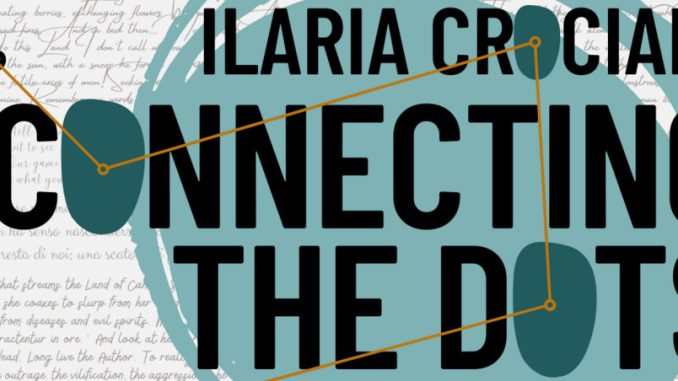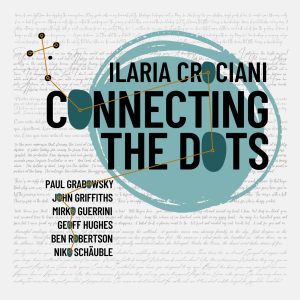
Review by Des Cowley.
Ilaria Crociani – Connecting the Dots (ABC, CD & digital)
Italian-Australian singer Ilaria Crociani was mildly amused when, at age-50, she found herself recipient of a 2021 ABC Jazz Composer Commissioning Fund, intended to support emerging artists. Despite having previously performed at the prestigious Umbria Jazz Festival, however, and recording a handful of albums – most with saxophonist husband Mirko Guerrini – it is fair to say she remains an under-represented name in Australian jazz. Connecting the Dots, then – the outcome of her ABC Jazz Commission – represents a significant step-up, destined to bring her work before a wider audience. With the Commission’s stress on original composition, the album offers a timely window onto the range of Crociani’s artistry.
 At heart, her new project returns ‘song’ to its storytelling traditions, weaving together a series of narratives celebrating women through history: stories of resilience, hardship, and hope. These range from Marion Bell, who drove around Australia in her Oldsmobile in 1925; Minnie Berrington, the first female opal prospector; and Barbara Strozzi and Isabella Leonarda, two 17thcentury composers of the Baroque period. To bring these tales to life, Crociani benefits from the support of an outstanding ensemble, featuring pianist Paul Grabowsky, saxophonist Mirko Guerrini, guitarist Geoff Hughes, bassist Ben Robertson, drummer Niko Schäuble, and – wait for it – lute player John Griffiths.
At heart, her new project returns ‘song’ to its storytelling traditions, weaving together a series of narratives celebrating women through history: stories of resilience, hardship, and hope. These range from Marion Bell, who drove around Australia in her Oldsmobile in 1925; Minnie Berrington, the first female opal prospector; and Barbara Strozzi and Isabella Leonarda, two 17thcentury composers of the Baroque period. To bring these tales to life, Crociani benefits from the support of an outstanding ensemble, featuring pianist Paul Grabowsky, saxophonist Mirko Guerrini, guitarist Geoff Hughes, bassist Ben Robertson, drummer Niko Schäuble, and – wait for it – lute player John Griffiths.
The album opens with ‘Mary Lou’, a breezy piece conjuring the dreamy romanticism of Getz/Gilberto, that recounts the story of Shirley Howard, who embarked on a solo journey around depression-era Australia on her pony named Mary Lou, in search of work. Crociani’s voice smoothly skates across piano and bass, her delivery almost lullaby-like. ‘Gina’ commemorates painter Gina Sinozich, who migrated from the Istrian Peninsular to Australia in the 1950s. Crociani leavens her vocals with measured nostalgia, evoking the longing any migrant feels for a homeland far away. Tinged with sadness, Grabowsky’s piano mirrors her lead, lilting and delicate. Grabowsky’s work is even more compelling on the following track, ‘Musicali Affetti’, which finds the pianist ever-so-gently improvising on the theme, unleashing a steady stream of cascading notes, enfolded by Hughes’s Spanish-tinged guitar.
Throughout, Crociani adapts, re-moulds, and shapes her voice in service to the songs. ‘Eat My Dust’, co-written with Niko Schäuble, recalls the distinctive art-house stylings of Swiss singer Irene Aebi, best-known for her work with saxophonist Steve Lacy. Crociani’s shape-shifting vocals freewheel over a staccato beat, as if trying to outpace Guerrini’s sax, as it feints and parries, dark and menacing. ‘Silent Words’, celebrating the convoluted life of fashion icon Veruschka, comes across as sixties cool, swept along by Grabowsky’s noodling piano and Guerrini’s occasional squalls. The fast-paced ‘The Author is Dead’, dedicated to Germaine Greer, is a standout. Driven by Schäuble’s percussive pulse, and Guerrini’s infectious sax riff, Crociani declaims a series of texts espousing polarised views about the larrikin philosopher. ‘Cosa Resta del Giorno’ is undoubtedly the most personal song on the album, a fifties-themed warm-hearted piece, rendered in Italian, that pays homage to the strong women in Crociani’s family.
Connecting the Dots is clearly a project close to Crociani’s heart, providing her with an opportunity to deliberate upon her forebears, teasing out their stories, and, in doing so, uncover traces and reflections of her own journey. The musical accompaniment, for the most part, is understated and minimal, awash with space, allowing these songs to breathe. To date, many of Crociani’s projects –Extasy Morricone, Radiosuccessi – have required her to hide her name behind a collaborative banner. In what can only be described as a welcome move, Connecting the Dots sees her stepping into the spotlight, placing her name, voice, compositions, and music, front and centre.

